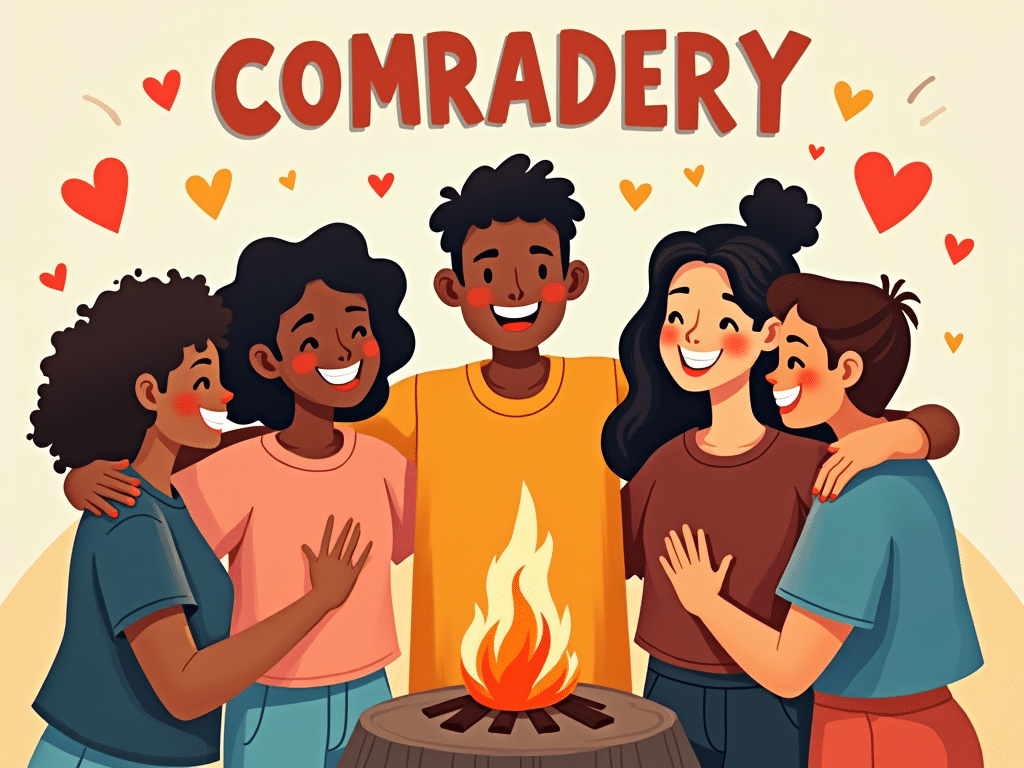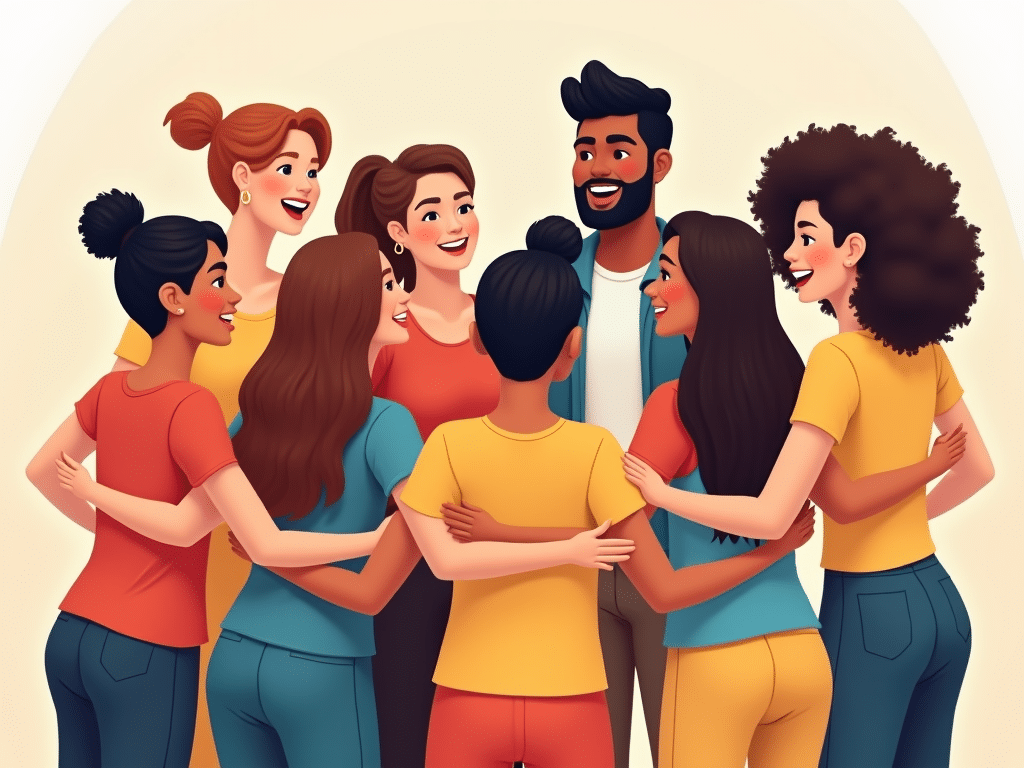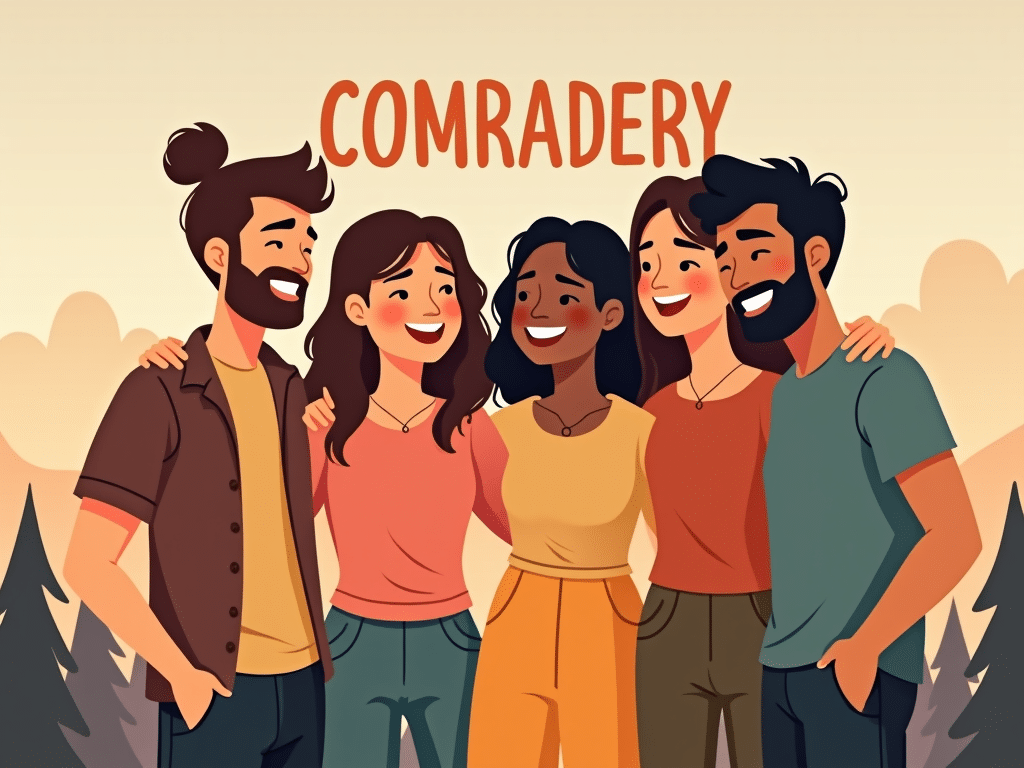Ever felt that unspoken connection with your teammates or friends? That warm, fuzzy feeling when you’re all in sync, finishing each other’s sentences, or just vibing together? Well, my friend, you’ve just experienced comradery in action! It’s like the secret sauce that turns a group of random people into a tight-knit squad. Whether you’re crushing it on the sports field, slaying a group project, or just hanging out, comradery is what makes it all click. Let’s dive into this awesome concept and see why it’s the glue that holds our social world together!
| Key Point | Details |
|---|---|
| Definition | A spirit of friendship and community among a group |
| Origin | Derived from “comrade,” with military and social connotations |
| Usage | Describing close bonds in teams, friendships, and communities |
| Importance | Crucial for team building, social cohesion, and personal well-being |
| Context | Workplace, sports teams, social groups, and more |

Comradery Meaning: Breaking It Down
Alright, let’s get real about comradery. It’s not just a fancy word for friendship – it’s like friendship on steroids, but in a good way! Comradery is that special bond that forms when a group of people come together with a shared purpose or experience. It’s the feeling you get when you’re part of something bigger than yourself.
Think of it like this: friendship is like having a buddy to share your lunch with, but comradery is like having a whole squad that’s got your back no matter what. It’s the difference between “Hey, wanna hang out?” and “We’re in this together, ride or die!”
Also read: Hundo P
Comradery in Text: In the digital world, comradery might pop up like this:
- “Our team’s comradery is off the charts! We’re gonna crush this project 💪”
- “Missing the squad and our epic comradery. Can’t wait for the next hangout! 🤗”
- “The comradery in our gaming clan is unreal. We’re not just players, we’re family! 🎮❤️”
It’s a way of expressing that deep, meaningful connection that goes beyond just being friends or colleagues. It’s about having each other’s backs, sharing laughs and struggles, and feeling like you belong.
The Origins of Comradery
Now, you might be wondering, “Where did this awesome word come from?” Well, buckle up for a quick history lesson!
- Military Roots: The word “comradery” comes from “comrade,” which has strong military vibes. It’s about the bond between soldiers who face danger together.
- Socialist Connection: “Comrade” was also big in socialist movements, where it was used to show equality and solidarity among workers.
- Modern Evolution: These days, comradery has broken free from its military and political roots. It’s now used to describe any group with a strong, positive connection.
It’s pretty cool how a word can start in one place and end up meaning something broader. Comradery has gone from battlefields to boardrooms to buddy groups, all while keeping that core idea of strong, supportive connections.
Also read: KIK
Building Comradery: Key Elements

So, how do you cook up some comradery in your squad? Here are the secret ingredients:
- Trust: This is the foundation. You gotta be able to rely on each other, no questions asked.
- Shared Goals: Whether it’s winning a game, acing a project, or just having a good time, having a common purpose brings people together.
- Open Communication: No mind-reading required! Good comradery means being able to talk openly and honestly.
- Support: It’s all about having each other’s backs. When one person wins, everyone celebrates. When someone’s down, the squad lifts them up.
- Shared Experiences: The more you go through together, the stronger your bond becomes. It’s like leveling up in a real-life game!
Think of these elements like the ingredients in a recipe. Mix them all together, and boom! You’ve got yourself some grade-A comradery.
Also read: Cockhair
Comradery in Different Settings
Comradery isn’t a one-size-fits-all deal. It shows up in all sorts of places, each with its own flavor:
- Workplace: It’s what turns coworkers into work buddies. When there’s good comradery at work, Monday mornings suck a little less.
- Sports Teams: Ever seen a team pull off an amazing comeback? That’s comradery in action. It’s the “we’re all in this together” spirit that pushes athletes to give their all.
- Friend Groups: This is where comradery gets its chill on. It’s the vibe that makes inside jokes hilarious and movie nights unforgettable.
- Online Communities: Yep, comradery can happen in the digital world too! Whether it’s a gaming clan or a fan forum, online squads can form tight bonds.
The cool thing about comradery is that it can pop up anywhere people come together with a shared interest or goal. It’s like social magic!
The Psychology Behind Comradery
Alright, let’s get a bit nerdy for a sec and dive into the brain stuff behind why comradery is so powerful. There’s more to it than just feeling warm and fuzzy (though that’s definitely part of it).
- Sense of Belonging: Humans are social creatures. We’re wired to want to belong to a group. When we feel that sense of comradery, our brains release feel-good chemicals like oxytocin, often called the “bonding hormone.”
- Stress Reduction: Being part of a tight-knit group can actually help lower stress levels. It’s like having a built-in support system. When you know your squad has your back, life’s challenges don’t seem quite so daunting.
- Motivation Boost: Ever noticed how you push yourself harder when you’re part of a team? That’s comradery at work. It taps into our natural desire to not let our teammates down.
Dr. Sarah Thompson, a social psychologist, puts it this way: “Comradery fulfills our basic psychological need for connection. It’s not just about feeling good; it’s about performing better and being more resilient in the face of challenges.”
Challenges to Comradery
Now, building comradery isn’t always smooth sailing. Here are some roadblocks you might hit:
Comradery Killers:
- Competition gone wrong (when it gets too cutthroat)
- Cliques or exclusion
- Lack of trust or communication
- Remote work making face-to-face interactions harder
But don’t worry! These challenges aren’t deal-breakers. They’re just hurdles to jump over on your way to squad goals.
Also read: Cockwarming
Fostering Comradery: Practical Tips
Want to level up your comradery game? Here are some pro tips:
- Team Building Activities: Yeah, they might seem cheesy, but they work! Try escape rooms, group volunteering, or even just a game night.
- Open Communication: Create spaces (physical or virtual) where people can chat freely. It could be a Slack channel for random chatter or a weekly coffee break.
- Celebrate Wins Together: Did someone crush a presentation? Did the team hit a big goal? Celebrate it! Order pizza, do a virtual toast, or just give a shout-out in the group chat.
- Shared Experiences: Plan activities that create shared memories. It could be a team retreat, a charity run, or even just tackling a tough project together.
Remember, building comradery is like tending a garden. It takes time, effort, and regular care, but the results are totally worth it.
The Impact of Technology on Comradery
In our digital age, comradery has had to adapt. Here’s how tech is changing the game:
- Virtual Team Building: From online games to virtual happy hours, technology is helping bridge the gap for remote teams.
- Digital Communication Tools: Platforms like Slack or Microsoft Teams are creating new ways for teams to bond, even when they’re not in the same room.
- Social Media: Company social media groups or hashtags can help foster a sense of community beyond the workplace.
But here’s the thing – while tech can help, it can’t replace good old-fashioned face-to-face interaction. It’s all about finding the right balance.
Also read: HOOAH
The Future of Comradery
So, what’s next for our friend comradery? Here are my predictions:
- Hybrid Bonding: As more workplaces go hybrid, we’ll see new ways of building comradery that blend in-person and virtual experiences.
- AI-Assisted Team Building: Don’t be surprised if AI starts suggesting personalized team-building activities based on team dynamics and preferences.
- Global Comradery: As teams become more international, we’ll see comradery that spans cultures and time zones.
One thing’s for sure – as long as humans are working together, we’ll need that sense of connection and shared purpose that comradery brings.
Also read: BBRT
So there you have it, folks. You’re now officially schooled in the art of comradery. Whether you’re part of a sports team, a work squad, or just a tight group of friends, you now know why that bond is so special and how to make it even stronger.
Remember, at the end of the day, comradery is about having each other’s backs, sharing laughs (and sometimes struggles), and feeling like you’re part of something bigger than yourself. It’s what turns a group of individuals into an unstoppable team. And in my book, that’s pretty savage. 🤝😎
P.S. If you’re looking to level up your teamwork game even more, why not check out some other cool concepts? For example, “WAGMI” (We’re All Gonna Make It) is a great mindset for team success. Or if you’re all about that hustle culture, “GMI” (Gonna Make It) might be your new mantra. The world of team dynamics is vast and varied – go forth and conquer!







